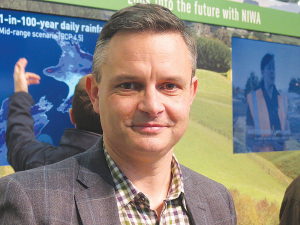94% of NZ farmers oppose Paris Agreement, survey shows
A survey of 2000 farmers shows 94% of respondents believe that remaining in the Paris Agreement for climate change is not in the country's best interest.
 Climate Change Minister James Shaw is being asked to front up and to discuss the “outstanding issues” that farmers have with the proposed agricultural emissions recommendations.
Climate Change Minister James Shaw is being asked to front up and to discuss the “outstanding issues” that farmers have with the proposed agricultural emissions recommendations.
Groundswell is calling on the Minister of Climate Change James Shaw to front up and to discuss the "outstanding issues" that farmers have with the current proposed agricultural mitigation recommendations.
The rural ginger group - and long-time critic of the agricultural sector's He Waka Eke Noa (HWEN) grouping of 11 primary sector bodies who have proposed the current reccommendations with the Governmnet - says it wants to find a "mutually agreed resolution".
Groundswell has written to the HWEN Steering Committee - as the ag sector's representatives - asking it to facilitate a meeting with Shaw.
"Big decisions are being made regarding the design of the emissions pricing mechanism, yet farmers have no understanding of the reasoning behind these decisions," the letter states. "This is leading to confusion and a lack of trust in the process."
Groundswell says it is willing to hold a live online meeting with Shaw and it hopes to make this discussion accessible for farmers to follow and engage in.
"We believe this open dialogue will help smooth the pathway to finding mutual agreement between the farming community and the Government and minimise the risk of further resources being wasted on proposals that do not meet the needs of farmers."
The group wants the meeting with Shaw to take place before any further government announcements and decisions on agricultural emissions pricing.
Groundswell’s farm emissions spokesman Steve Cranston told Rural News that it is unreasonable for Shaw to expect farmers to support an emissions pricing scheme if he is not willing to front up and engage with the farming community on its concerns.
He says one of key issues farmers would like to be openly debated is what factors are preventing GWP* from being integrated into the HWEN pricing scheme.
“Farmers want transparency on the warming effect of our emissions and GWP* appears the best method of achieving that,” he told Rural News. “If the minister has reservations about using GWP*, this is his opportunity to explain these to farmers.”
Cranston says farmers also want to know what is restricting the Government from including a wider range of on-farm sequestration for mitigating their emissions.
“The Government’s current interpretation of the ‘additionality’ clause excludes vast swathes of regenerating vegetation, which could potentially be included,” he explains.
Cranston adds that farmers are also asking if HWEN’s current interpretation is in line with our international competitors or putting NZ farmers at a disadvantage.
He says there are also questions around HWEN being better used to promote NZ’s farming sector and demonstrate its low carbon and low warming footprint.
“We believe HWEN could be more integrated with other environmental policy objectives,” Cranston adds. “There are significant opportunities to incentivise biodiversity and water quality objectives via HWEN, which have not been properly explored.”
Meanwhile, a spokesman for Shaw told Rural News that no decision had been made on him meeting with Groundswell.
“We understand they [Groundswell] have sent a letter to the He Waka Eke Noa Partnership requesting that they facilitate a meeting with ministers, but it hasn’t gone any further than that at this stage.”
Voting has started for the renewal of DairyNZ's milksolids levy.
The most successful catchment groups in NZ are those that have 'a source to sea' approach.
Associate Agriculture Minister and Manawatu dairy farmer Andrew Hoggard says the free trade agreement (FTA) negotiated with India is not a bad deal and his party, Act, will support it when it goes before Parliament.
Newly released data from Environment Canterbury (ECan) Farm Environment Plan (FEP) audits are showing a dramatic lift in environmental performance across the region.
A solid recovery of global dairy prices this year makes a $9.50/kgMS milk price almost a shoo-in for this season.
As New Zealand marks the United Nations’ International Year of the Woman Farmer 2026 (IYWF 2026), industry leaders are challenging the misconception that women only support farming.

OPINION: Here w go: the election date is set for November 7 and the politicians are out of the gate…
OPINION: ECan data was released a few days ago showing Canterbury farmers have made “giant strides on environmental performance”.